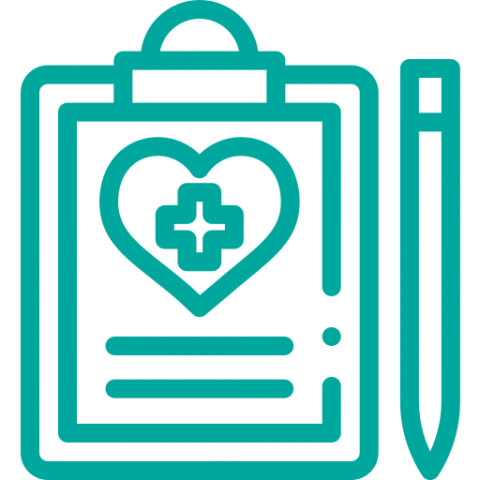Medical or clinical internships are an important step in getting a higher education degree or post-graduation employment. For deaf students, navigating communication access in these settings is vital to achieving #DeafSuccess. In fact, how to best get this access is a frequent inquiry through our NDC | help team. Our team has gathered information and resources to assist in planning, coordinating, and collaborating with students and sites to ensure the best possible internship experience.
Plan Ahead for Communication Access
Providing accommodations in clinical/medical settings can be done. Communication access requires advance planning and dialog for dynamic environments, such as clinical settings. Start by keeping the planning student-centered. Find out from them about their past experiences and comfort level with certain accommodations used in education and other environments. This helps determine access options to effectively participate in the internship/clinical activities. NDC’s Interactive Process Tools: Sample Deaf Student Interview Questions could assist with exploring access arrangements, some of which may be new for the student to consider.
Medical settings can be very dynamic situations. To help prepare, review our Deaf Healthcare Students and Professionals topic page that provides information on technical standards, testing, and accommodation protocols. This would also be a good opportunity to discuss what to do if they encounter barriers in certain situations and brainstorm ideas on how to best address them. Collecting as much information as possible on what the internship entails will be critical for arranging assistive technology or securing service providers with a background knowledge, skills, and experience to ensure effective services for your student.
You must also consider your student’s preferred method of communicating within the specific environment. Remember, identifying appropriate accommodations in settings like this is often a trial-and-error process. It is important to have a back-up plan using different communication strategies in the event one is not effective for the student.
Accommodation Options for Your Student
Explore these accommodation options with the student for a variety of different settings they may encounter. For some settings, the student may need more than one accommodation to provide complete access:
-
Encourage the student to try different speech-to-text services or sign language interpreting to access auditory information for a variety of settings. These services are available remotely and the student will need to experiment with accessing this service through a laptop, tablet, or mobile device/phone. NDC can provide further assistance on coordinating speech-to-text services as well!
-
Assistive listening systems are another accommodation to consider that can be used with or without connecting to personal hearing assistive devices. Refer the student to reach out to an audiologist to learn more about technology that can assist with communication with their specific hearing loss.
-
Use clear face masks to see if they would be helpful for this student to communicate effectively.
-
Tools for impromptu, brief communication:
-
Boogie Board or dry-erase boards to write quick notes.
-
Text devices (i.e., smartphone) or tablets that could be used to allow typing back and forth.
-
Automated Speech Recognition (ASR) apps are only effective in quiet environments, and there are limits to its effectiveness and accuracy.
-
Flexibility in these settings can empower your deaf student to explore effective communication options to help prepare them for similar work experiences in the future. Check in with your student occasionally to inquire if their current accommodations are conducive to communication access or not. The key is to have an understanding that the situation may change as the student’s experiences change. However, the goal remains the same: to reduce the probability of encountering barriers.
NDC has more additional information on supporting deaf students in internships and clinicals that you can use as well:
-
Equitable Access Guide: Understanding Legal Responsibilities for Institutions:
-
Section 7 on Technical Standards
-
Section 9 on Internships and Accessibility
-
Collaborate with Internship Site Staff
An all-around team effort with the student, the faculty member overseeing the student’s clinical internship, and the internship site supervisor is essential to create and ensure an accessible internship experience for the student. Often, healthcare clinical sites may have little exposure or experience working with deaf people in the workplace, so it is important that the staff at the clinic have an understanding of how to effectively work with a deaf student in this unique environment. You can share the following NDC resources with the staff:
-
Deaf 101 is an online course that provides basic knowledge and tools necessary to communicate effectively with deaf people, especially in professional settings.
-
Communicating with Deaf Individuals, provides an overview of communicating with deaf people in a Q & A format and includes some communication strategies and tips.
-
The Deaf Community: An Introduction discusses the members of the Deaf community, the characteristics of Deaf culture, and those who use sign language as their primary language.
For additional ideas on how to work with internship site staff, the Coalition for Disability Access in Health Science Education supports disability services professionals working with medical colleges/programs, including a listserv where you can ask colleagues for strategies that they have implemented in the past. NDC’s listserv can also serve as a tool for seeking input and suggestions from colleagues.
Additional Resources
You are not alone in making sure deaf students have communication access. These additional resources that support accessible health care settings and examples of deaf students who have navigated medical education experiences may be useful. As a federally funded program, we do not endorse or recommend specific products, agencies, vendors, or other services.
-
Association of Medical Professionals with Hearing Loss (AMPHL) organization offers resources and a network of medical professionals and aspiring professionals with hearing loss. This would be a great opportunity for the student to connect with other deaf medical professionals who have knowledge or experience. They also have a Facebook group.
-
#DeafSuccess videos of deaf medical professional’s stories:
-
“Technology Assures Deaf Student Learns Surgery at UC Davis School of Medicine” (shows the use of remote captioning in an operating room)
NDC is always here to provide information and resources that are helpful in your planning process for navigating accessible environments for deaf students. Reach out to our NDC | help team if you need more support.









